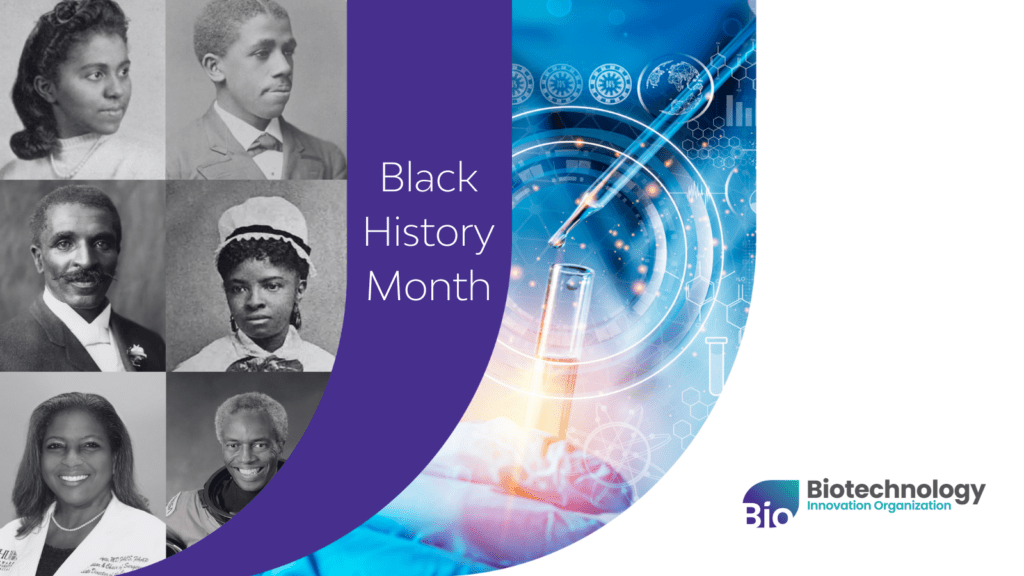February marks Black History Month, an important annual reminder of the contributions Black and African Americans have made to the progress of biotechnology, and more broadly, STEM fields.
As we start the month, here are six Black STEM pioneers you should know.
1. George Washington Carver
George Washington Carver, who was born into slavery, went on to become the first Black American to earn a Bachelor of Science degree when he graduated from Iowa State University in 1894. He went on to become the first Black faculty member at Iowa State, offered the position as a result of his excellence in horticulture and botany. Upon earning his master’s degree in 1896, Carver was offered a faculty position at the Tuskegee Institute in Alabama, where he achieved international recognition for his important work.
He is renowned for his accomplishments as an agricultural scientist and an inventor. Carver is best known for his many scientific innovations involving peanuts, but some of his most important scientific achievements were in work to prevent soil depletion. He was awarded the Spingarn Medal in 1923 from the National Association for the Advancement of Colored People (NAACP).
2. Dr. Edward Bouchet
Dr. Edward Bouchet was the first Black American to earn a doctoral degree from an American university in physics from Yale in 1876. Additionally, his academic accomplishments were further recognized in his becoming the first Black person to be nominated to Phi Beta Kappa. Furthermore, Bouchet was only the sixth person in the Western Hemisphere at that time to have earned a doctorate in physics.
After attaining his education, Bouchet became a science teacher spending most of his career with the Institute for Colored Youth in Philadelphia. If Bouchet had been white, his education would have undoubtedly allowed him to teach at the university level, an opportunity he was denied. He is known to have been active in the NAACP and was a member of the Franklin Institute and the American Academy of Political and Social Science.
3. Dr. Marie Maynard Daly
Dr. Marie Maynard Daly was the first Black woman in the United States to earn a doctorate in chemistry at Columbia University in 1947. It only took her less than three years to complete her thesis, titled “A Study of the Products Formed by the Action of Pancreatic Amylase on Corn Starch.” This thesis made important contributions to better comprehending how enzymes break down food.
Maynard Daly conducted this thesis working with the only female chemistry professor at Columbia University at the time, Dr. Mary Letitia Caldwell. She was a lifelong advocate for increasing educational opportunities in medical schools and graduate programs in the sciences for minority students.
4. Dr. Rebecca Lee Crumpler
Dr. Rebecca Lee Crumpler was the first Black woman to earn an M.D. in the United States, at a time when most medical schools barred Black students. Dr. Crumpler graduated in 1864 with her M.D. from the New England Female Medical College. Crumpler’s “Book of Medical Discourses,”published in 1883, is one of the very first medical publications by a Black medical author in the United States. The book primarily focuses on providing medical advice for both women and children. Prior to her admission to medical school, Crumpler worked as a nurse for eight years.
5. Dr. Andrea A. Hayes Dixon
Dr. Andrea A. Hayes Dixon is the first Black woman to be appointed as Dean of Howard University’s College of Medicine in 2022. Hayes Dixon was also the first Black woman to become a board-certified pediatric surgeon in the United States in 2004.
6. Colonel (Ret.) Guion “Guy” Stewart Bluford, Jr.
Colonel (Ret.) Guion “Guy” Stewart Bluford, Jr., Ph.D., is the first Black American to go to space as a member of the crew of STS-8 on the space shuttle Challenger in 1983. Bluford has served on several different boards, including the Space Foundation, the Aerospace Corporation, the National Research Council’s Aeronautics and Space Engineering Board, and the American Institute of Aeronautics and Astronautics (AIAA). In 2010 he was inducted into the U.S. Astronaut Hall of Fame.
Working towards better outcomes
As much progress as there has been, there’s still much work to be done when it comes to reducing disparities in STEM fields. According to a November 2023 RTI and Sloan Foundation report, only 5 percent of STEM Ph.Ds. awarded in the United States in 2021 went to Black scientists despite 12 percent of the U.S. population being Black.
Furthermore, Black scientists have been disproportionately impacted when it comes to borrowing for their education. Per this report, 49 percent of Black Ph.Ds. borrowed more than $50,000 to pursue their education, compared to 8 percent and 15 percent of their Asian and white colleagues, respectively, per the report.
The Biotechnology Innovation Organization (BIO) is committed to championing the innovation and understanding necessary to tackle inequities and disparities in STEM fields. We are proud to celebrate Black History Month and seeing innovation increase as disparities decrease.




